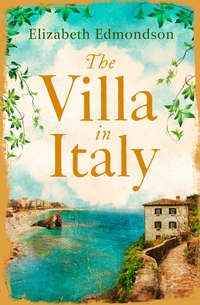
Полная версия
The Villa on the Riviera: A captivating story of mystery and secrets - the perfect summer escape
She could go back to her studio and work. No; the painting on her easel at the moment wasn’t coming out as she wanted it to, and it grew more unpleasing by the day. Figures on a street, but as Oliver remarked, it looked like the worst excesses of the industrial revolution, with gaunt figures against a backdrop of chimneys.
‘It’s London.’
‘Never. It’s undoubtedly some dreary northern street, you’ve caught the spirit of disillusion and hopelessness wonderfully well.’
‘It’s meant to be Russell Square in the rush hour.’
‘One day, Polly, you’ll find what you really want to paint, and it won’t be rat-coloured figures in a dismal landscape, no, nor those fetching but trivial book jackets you do for WH Smith. Nor touching up flower paintings in Rossetti’s workshop.’
‘The jackets and the flowers make me money.’
‘Of course, and even an artist must live, if only on eggs and soup. I daresay you could make an excellent career out of nothing but the book jackets; they have a charm which is, you don’t need me to tell you, quite lacking in your paintings.’
His words had stung Polly. No artist himself, he chose to find his company among artists, and was renowned for having an eye and an unerring instinct for putting his finger on the weakness in any artist’s work. And Polly, honest with herself, had to admit that her art was never going to please her or anyone else unless it changed dramatically.
Her friend, Fanny Powys, happy in her own work of silkscreen printing, had tried to cheer Polly up.
‘Oliver doesn’t bother to make his sharp remarks about painters he doesn’t think have any talent. If he’s polite, you know that artist’s a no-hoper.’
And Fanny should know, for it was at the private view of an exhibition of her prints that she had introduced Oliver to Polly. Polly, her attention entirely on a vigorous design taken from the whorls of oyster shells, had paid scant notice to the tall man who remained standing beside her.
‘It’s a matter of patterns,’ he said. ‘That’s what makes Fanny’s work different from most of her kind.’
And Polly had found herself drawn into a lively discussion about silkscreen printing, which led to wider topics of contemporary art. Polly was amazed that Oliver, who was, he had at once told her, not an artist, should have such an eye, such a quick appreciation of what artists such as Fanny were about.
‘I grew up surrounded by paintings and works of art,’ he explained. ‘My father is a collector, and very knowledgeable. He’s always been interested in the artists of the day as much as in past masters, and so I follow in his footsteps.’
Polly disagreed with Oliver about the work of several painters, and the argument was continued over supper at Bertorelli’s, the restaurant that was to become their favourite eating place.
Polly had taken an immediate liking to Oliver. ‘We are snip and snap,’ she explained to Fanny. ‘Oh, it’s not sex, although I suppose … No, it really isn’t. Affinity, that’s the word.’
‘A strange affinity,’ Fanny said drily. ‘Polly Smith and the Hon. Oliver.’
‘Hon.?’
‘His father’s a lord. Didn’t he tell you?’
Polly pondered on this piece of information. Did it make a difference? No, Oliver was Oliver. Of course he had another life, far removed from the impecunious day-to-day existence of artists like herself. Yet he was, in his way, one of them. ‘He’s a friend,’ she told Fanny. ‘We like one another’s company. Our minds are in harmony. That’s enough for me, his being an Hon. is neither here nor there.’
A man in a dark coat said, ‘Excuse me,’ in affronted tones, as though Polly were standing there with the express intention of keeping him from his tobacco, and she moved out of the way, back into the full force of the wind and the rain.
She made up her mind. She would go back to Highgate, and consult Ma about the passport photograph. Maybe she could suggest who could sign it for her.
Dora was at her piano; even on her busiest days, she never did less than two hours’ practice. In the kitchen, Mrs Babbit, the char, was singing loudly to herself as she turned out a cupboard.
‘How can you play with that noise going on?’ Polly said, as she always did.
‘Focus,’ said Dora, as she always did. Polly, somewhat hesitantly, because she didn’t want to sound accusatory, explained her problem.
‘I never thought of that.’
‘If I’m illegitimate, which I am, then that’s a fact, and there’s no point denying it,’ Polly said.
‘And no need to go broadcasting it from the rooftops, either. I’ve protected you from that all these years.’
‘And it wouldn’t be good for you if word got around. I don’t live here any more, but you do. I’ve been racking my brains, but I simply don’t know these professional kind of people, except the vicar here, and Miss Murgatroyd.’
‘It’ll have to be Dr Parker,’ Dora said. ‘He knows you aren’t my daughter, and he’ll sign it for you.’
‘You told him?’
‘When Ted and I were still hoping for children. He’s never said a word to anyone all these years, he won’t say a word now. Go along right away, and you may catch him before he sets off on his rounds.’
Polly arrived at the doctor’s house just as he was putting his medical bag into his black Wolseley. As she called out to him, he looked up with the long-suffering expression of a doctor trying to get away, but he smiled when he saw who it was.
‘I thought you were another patient.’
‘Well, I am, I suppose, but I’m not ill. I’m never ill.’
‘So what can I do for you?’
‘It’s a photograph, for a passport. It needs a signature. I thought … Ma said …’
Dr Parker was suddenly alert, and he drew his bushy brows together. ‘Passport, eh? So Dora’s had to come clean at last, I suppose.’
‘Yes.’
He ran his eyes down the form. ‘I’ve done this often enough before.’ He opened the car door. ‘Can’t do this standing in the rain.’
The car smelled musty and leathery. Comforting, somehow. He rested the photo on the steering wheel and took a fat black fountain pen out of his inside pocket. He unscrewed the cap and turned the photo over. ‘Read out the exact words, Polly, and then you can tell me who you are.’
‘Polyhymnia Tomkins, I’m afraid.’
‘Good God. Let’s hope I can spell Polyhymnia.’
‘P-O,’ began Polly.
‘It’s all right, I can remember enough of my classical education to cope with that. One of the muses, wasn’t she?’
‘Yes.’
‘And Tomkins was Dora’s maiden name. You’re her sister’s child.’ And then, catching sight of the bleak look on Polly’s face. ‘Cheer up, young lady. As a doctor, I could tell you, if I didn’t know how to keep my mouth shut, how many people even in this small part of London aren’t quite what or who they think or say they are.’
‘What do you mean?’
‘Daughters who are actually granddaughters, sons who were born a year after their named fathers went away to the war, married couples who never went before a priest or a registrar. Your secret’s perfectly safe with me, Polly. Besides, you’ll soon be Mrs Harrington, and no one will know or care what your name was before that.’
‘No,’ said Polly, as he wrote on the back of the second photograph and handed it back to her.
‘Tuck those away safely, or the ink will run in the wet and it’ll be all to do again. Are you going abroad for your honeymoon?’
‘Roger likes mountains, so it’s to be the Alps.’
‘The mountain air will do you good, bring some colour back to your cheeks. As your medical man, I can tell you that you’re looking a bit peaky.’
‘I don’t like the winter. And I’m not sure about mountains. It’ll be cold.’
‘But bright.’
The birth certificate arrived in a brown envelope, stamped OHMS. Polly hesitated, then pulled it out and read it. Brief was the word. Name, place of birth. She would go today to the Passport Office; if she put it off, she might never do it, but once she’d handed over the form and the photographs and the birth certificate, it would be out of her hands.
What would Roger say when he asked for the birth certificate? Would he ask why she didn’t have a full one? Could she pretend she asked for a short one because it cost less? That wouldn’t be quite honest, she must pluck up her courage and tell him the truth about her parentage.
With this uncomfortable thought in her mind, Polly went off to Petty France, to wait on a hard wooden bench before being called up to show her papers, hand in the forms and address an envelope to herself. The passport arrived three days later, dark blue, embossed in gold with the royal coat of arms, and filled with stiff empty pages.
And there, written in an official hand was her new identity, Polyhymnia Theodora Tomkins. Born Paris, May 1, 1908.
FOUR
As a child, and indeed until she left her home in Highgate, Polly had disliked Sundays. Not because the Smiths were tyrannical Sabbath-keepers, but because of the general dreariness of the day. Almost, she wished Dora had been a churchgoer, since friends and neighbours who did attend divine service on Sunday mornings seemed to enjoy their day much more than the Smiths did.
Dora, however, was an agnostic. ‘I’m not saying there is or isn’t a God,’ she told Polly. ‘That’s for everyone to decide for him or herself. On balance, I’d say there’s more to life than what we can see, music is proof of that.’ Dora had a fine contralto voice, and sang with the London Bach Choir; they had just given a performance of the St John Passion, ‘And I defy anyone to listen to Bach and not be touched by a greater spirit. One thing I’m certain of, which is that any God there happens to be isn’t in attendance at St Jude’s on a regular basis at eleven o’clock on Sunday mornings. Nor at any other time. I shouldn’t have any respect for a deity who chose to be in that place in that company.’
So Dora spent Sundays catching up with herself, as she put it. She took in a Sunday paper, which she read in the morning. In the afternoon, she listened to the wireless and did some mending. In the evening, she usually went round to the Mortimers at number 19, to play cards. All of which, to the young Polly, spelled boredom. Sunday was a tedious day, twice as long as any other day of the week, a day when she felt caged and confined. By Sunday evening, she was longing for the day to be over and for Monday to come.
Once she had left Bingley Street, Polly’s Sundays improved. She often spent the day with friends, discussing Life and Art, and, in good weather, going on the river or borrowing a bicycle and going for long rides into the country. On Sunday evenings, there was always a group of convivial souls gathered at one or other of the pubs they patronized.
All that changed once more when she met Roger. In fact, her more cynical friends claimed that it was because of Sundays that she had got engaged to Roger. Roger was at his best on Sundays, more relaxed, warmer, his mind not so engaged with his work. However, he was still a punctual man, Sunday or no Sunday, and Polly cursed when she looked at the clock and saw the time. Twenty-five past ten. That was the penalty for idling in bed, but on a winter morning it took a lot of effort to leave the warm covers and get dressed in a room so cold that the windows were still frosted over halfway through the morning.
Damn, there was a hole in her lisle stockings. Would it show? Yes, it would. She had approximately five minutes before Roger would draw up outside the house and give three short blasts on his horn, expecting the front door to open at once.
Too bad, he’d have to wait. She found her sewing kit, and with the stocking still on her leg, cobbled the edges of the hole together. It didn’t look good, but it was better than a patch of bare leg showing through. Toot, toot, toot. There was Roger. She dragged a comb through her hair; she had slept on a lock which now jutted out at a strange angle, well, it couldn’t be helped. She tucked her hair up into her beret, grabbed her handbag, and hurried down the stairs.
Roger was standing beside his MG, looking at his watch. ‘Really, Polly, I don’t know why you can never be ready on time.’
‘Good morning, Roger,’ she said, giving him a peck on the cheek. He held the car door open for her and she got in. ‘I found a hole in my stockings, I had to mend it, imagine what your mother would think.’
He glanced down at her leg. ‘Those are terrible stockings, anyhow, why don’t you get yourself some decent ones?’
‘I’m broke.’
‘I don’t know what you do with your money, you never have a penny.’
‘I don’t have many pennies to start with.’
‘When we’re married, I’ll give you an allowance, but you’ll have to keep track of where it goes, keep accounts and so on.’
The sun had straggled out after days of greyness, and Polly felt too cheerful to let the thought of keeping accounts daunt her. ‘I expect I’ll manage. And I’ll have my money from the workshop as well, besides what I earn from …’
‘The workshop?’ said Roger, accelerating with a throaty roar of the car engine. ‘Certainly not. I can’t have my wife going out to work, let alone in a place like that.’
Now the sun seemed much less bright. ‘But Roger …’
‘No buts, Polly.’ He turned his head and gave her a warm smile, that particular smile was one of his most likeable features. ‘Come on, Polly, you know it isn’t the thing. Not for a doctor’s wife. Of course you must keep up with your art, do those book jackets and so on, and you said you were hoping to get some illustrations to do, that’ll bring you in a bit of pin money. That’s quite different from going out to work at that place. If you want to fill in your time to some purpose, I’m sure we could find you a suitable position at the hospital, at the welfare section, perhaps.’
There were, Polly realized with a sense of apprehension, a lot of things she and Roger had never talked about. Not because he found it difficult, but because he didn’t think there was anything to discuss. So much for Roger’s vaunted socialism, so much for equality. The Rogers of this world were a great deal more equal than the Pollys, that was the fact of the matter.
Roger took a sharp corner with a screech, and Polly clung on to the door. Behind the wheel of his car, Roger changed from a sensible, almost cautious man into a daredevil; thank goodness on a Sunday morning there wasn’t much traffic about. ‘I don’t want to give up my work.’
‘Polly, be reasonable. You’ll be starting a new life, you’ll be a new person, Mrs Roger Harrington. It wouldn’t be at all suitable for you to carry on — it’s not really the kind of job that — well, it isn’t suitable, that’s all. Besides, we’ll want to have children, a baby will put a stop to all that kind of thing.’
Roger hadn’t been impressed by the workshop on the one occasion he had been there. He’d come to pick up Polly, and Sam, spying him in the yard below, had called to Polly that her young man was here, and shouted to him to come up.
Roger hadn’t taken to Sam — ‘What an extraordinary young man, I’m not sure it’s quite the thing, Polly, you working up there alone with him.’
Sam hadn’t been any more flattering about Roger. ‘Can’t you do better than that, Polly? Look at his mouth, he’s quite handsome now, but that’s going to get more and more rigid as the years go by. I smell a disapproving man, you want to watch out, it’ll be disastrous getting hitched to a man who disapproves.’
‘What rubbish you do talk,’ Polly had said, annoyed, but then, at Roger’s remarks, she had had to swallow her amazed laughter. ‘I’m perfectly safe with Sam, I assure you. And mostly Mr Padgett’s there as well, and other assistants who come and go. Honestly, what do you imagine? Wild lust among the paint tubes and the canvases?’
‘I do wish you wouldn’t say things like that.’
Polly usually found Roger’s prim ways rather endearing, but this time it annoyed her. ‘Oh, Roger, can’t you see at a glance that Sam’s as queer as a square button?’
‘No, I cannot, and I don’t like to think that you could. Do you realize what you’re saying? Do you realize that it’s a criminal offence? Never mind. I put it down to naivety. As a medical man I have some understanding of such people, but it’s wholly inappropriate for you to make such remarks, you don’t know what you’re talking about.’
She wasn’t going to argue, not now, not this morning, and here they were, in Bryanston Square, and there was Roger’s sister, Alice, waving at them from behind the wrought-iron railings of the first-floor balcony.
Roger screeched to a halt in front of the large terraced house, and went round to open Polly’s door. The front door of the house was already open, and Dr Harrington, Roger’s father, came down the shallow steps, smiling a welcome. ‘Come in, my dear, come in, you must be freezing, driving in that open car of Roger’s, really, it’s high time he bought a saloon.’
And up the stairs to the drawing room, where one of the other Drs Harrington, Roger’s mother, sat in a comfortable chair with her youngest grandchild on her lap, looking pleased, and telling Alice to ring for Foster to bring fresh coffee.
Polly let out a sigh of pure pleasure. The Harrington family were, to her, like something out of a book: read about, dreamed about, but known not to exist outside the pages of a story. But they did exist, here they were, and what was even more wonderful, she was part of the family, or soon would be.
The drawing room was large, with tall sash windows that looked out over the green garden of the square. It had a formal marble fireplace in which a substantial fire was blazing. Everything in the room that could shine, shone: the brass fire surround, the window panes, the large mirror on the wall, the polished surfaces of the tables.
Roger had an older brother, Edward, another Dr Harrington, a rising man in his field of eye surgery, who was married to Celia, herself the daughter of a distinguished consultant. She was a qualified pharmacist, and an asset to her husband. Alice was Roger’s younger sister, still a schoolgirl, she rather frightened Polly with her ferocious personality, and it always surprised her when Alice expressed admiration for her calling as an artist.
‘It’s a vocation, isn’t it? Just like my family think medicine is. I mean, you have to do it, whether you want to or not,’ she had said to Polly the first time Roger had brought her home to meet his family. ‘Writers are the same, they get twitchy if they don’t write. Does Roger understand that, I wonder?’
Celia came and sat on the sofa opposite Polly. Polly braced herself, for although Celia was always kind and polite, Polly knew quite well that Celia felt it her duty to fill Polly in on various matters of life that would be important for any woman married to a Harrington. ‘You’ve had your hair cut, I see,’ was her opening gambit.
No, strictly speaking that wasn’t true. Polly had cut her own hair. Thick, straight and heavy, she trimmed it into an approximation of a bob, leaving it long enough to pin up if she wanted it out of the way.
‘I can recommend my hairdresser, Miss Lilian, at the Westbury Salon.’
‘Thank you,’ said Polly, hating the sound of Miss Lois, but having to admit to herself that Celia’s sleek cut was a delight.
Lunch was announced, and they went downstairs to the dining room, a handsome panelled room on the ground floor, with portraits of earlier Harringtons looking benignly down from the walls.
Sunday lunch at the Harringtons was always the same. Soup, a joint and a pie.
Always plentiful, always beautifully cooked, always delicious. Today it was a thick leek and potato soup, followed by roast beef and Yorkshire pudding, with roast potatoes, buttered parsnips and cabbage.
Edward turned to Polly as she was about to take a mouthful of Yorkshire pudding smothered in rich gravy.
‘Have you and Roger settled the day yet? January’s not far away now. Then off to the Alps, how I envy you.’
Roger wiped his mouth and laid his napkin beside his plate. ‘Slight change of plan, actually,’ he said. ‘Sorry, Polly, I’d meant to tell you before, but I thought I might as well tell everyone at the same time. I only heard on Friday. The fact is, I’ve been offered a chance to go to America — you remember, Father, I told you I might apply for one of the Leadenhall Awards? Well, I’ve got it.’
A minor uproar broke out around the table, with mingled congratulations and questions. A success for any one of the Harringtons was felt by them to reflect well on the whole clan.
‘What does it entail?’ Dr Harrington senior asked.
‘I get six weeks in Boston, all expenses paid, and a chance to work with some of the top men in the field.’
Polly said nothing. Alice too was silent, and she looked directly at Polly. ‘You don’t mind a bit, do you?’ she said in a soft voice.
‘No,’ Polly whispered back.
‘I am sorry, old thing,’ Roger was saying to her. ‘I didn’t tell you I’d even applied, because of course I never expected to get a scholarship, the competition’s fierce.’
‘Why don’t you get married at once and go to America for your honeymoon?’ said Celia brightly.
Polly looked at Roger, alarmed. Of course, she’d love to go to America, but …
‘Impossible, I’m afraid. It’s definitely just me, there’s no provision for wives. You won’t mind, Polly, will you? After all, since we’ve been engaged for more than a year, two or three more months are neither here nor there.’
‘No, of course I don’t mind,’ Polly murmured, trying to hide her relief. For goodness sake, what was the matter with her? She was genuinely fond of Roger, if not exactly passionately in love; he represented stability, security, safety, and when she was married, she would acquire what she’d never had: a family. A brother and a sister, and Dr Harrington the father she didn’t have. If Roger’s mother was a trifle too austere to count as the maternal type, well, she had a mother of her own. Two, in fact. Quite enough for anyone.
That brought her up short. Could it be that Polly Smith, daughter of Ted and Dora Smith, was perfectly ready to marry Roger, but that Polyhymnia Tomkins, daughter of Thomasina Tomkins, would rather marry quite a different sort of person — or not get married at all?
At least this meant that she could postpone the day when she had to come clean to Roger — and to his family, he shared everything with his family — about who she really was. How would they react when she revealed that, instead of being the daughter of respectable people, not on a par with the Harringtons as to background and wealth, of course, but just about acceptable, she was illegitimate? What would they say to a bastard in the family? Dr Harrington liked to think of himself as broad-minded, but Polly had an idea that Roger’s mother might have been happier if Roger had become engaged to another Celia.
Polly had never subscribed to the school of getting unpleasant things over with; she always lived in hope that if you put off what was disagreeable, it might go away, and she had found this was often the case.
‘When do you go?’ Mrs Harrington was asking Roger, and Polly knew she was thinking of suitable clothes and packing. ‘Isn’t Boston terribly cold in the winter? Did you order a new overcoat? Will it be ready in time?’
‘I sail on Saturday. On the United States.’
Should she be wrinkling her brow and worrying about whether Roger would have enough warm socks? Polly asked herself. Bother socks, let him worry about them himself.
‘I’ll be back by the end of January, so we can get married in February. Which reminds me, you’ll need a passport.’
‘I got it,’ said Polly. Oh, God, Polyhymnia Tomkins; surely her duplicity, her new identity must show in her face; go away, Polyhymnia Tomkins, she said inwardly; you aren’t wanted in Bryanston Square.
Roger raised his eyebrows to heaven. ‘I know what you’ve done, you’ve got one in the wrong name.’
‘What?’ Polly said, her voice squeaky, how did he know?
‘You’ve got a passport in your maiden name, haven’t you? Whereas you need one in your married name. What a nuisance, but you can turn it in and I’ll put you on mine. I thought it would be advisable for you to have one for yourself, in case we have to travel separately at any time, but I don’t suppose that will ever arise. Meanwhile, you’d better give it to me, I’ll see to it, and I don’t think that room of yours is a safe place to keep valuables.’







